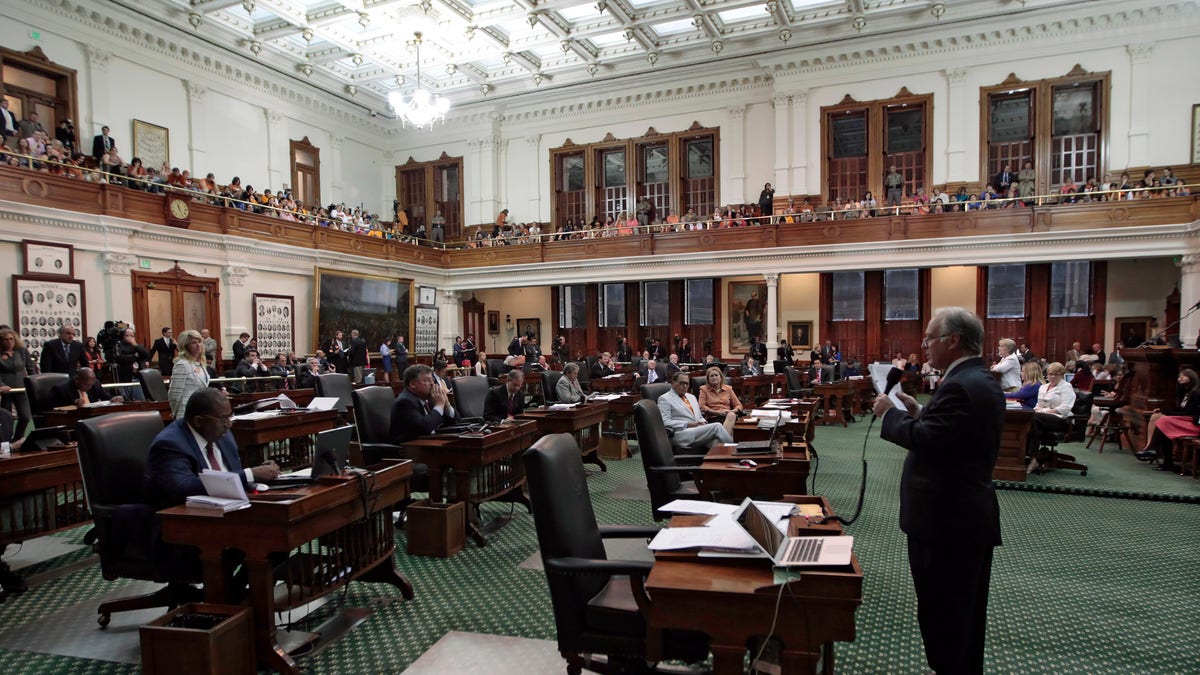
AUSTIN, TX - JUNE 25: State Sen. Kirk Watson (D-Austin) helps the Democrats defeat the anti-abortion bill SB5, which was up for a vote on the last day of the legislative special session June 25, 2013 in Austin, Texas. A combination of a 13-hour filibuster by State Sen. Wendy Davis (D-Ft. Worth) and protests by reproductive rights advocates helped to ultimately defeat the controversial abortion legislation at midnight. (Photo by Erich Schlegel/Getty Images) (2013 Getty Images)
AUSTIN, Texas (AP) – Business interests are walking the halls of the Texas Capitol calling on lawmakers to rethink some of their past policies, hoping that after the November election they can win some key victories next year.
The business lobby's wish list, expressed at legislative hearings and press conferences, includes better-educated workers, more spending on infrastructure and an overhaul of immigration policies. Where these issues fall on the ideological continuum is in the eye of the beholder, but for these trade associations and executives, these are the essential duties of government and critical for economic growth.
Candidates running for election in November are also taking up these issues, but surprisingly their positions are not breaking along traditional partisan lines.
Immigration policy is the most volatile issue, and one that is dividing Texas Republicans. A coalition of trade associations representing restaurants, hotels, agriculture and property owners has called for legalizing the workers currently in the country — who don't have a criminal record — and setting up a reliable pipeline to bring in more immigrant labor as needed.
While the main target of their lobbying effort is the Republican caucus in Congress, immigration policy has divided Texas Republican primary voters, who largely oppose relaxing current laws, and Republican leaders who are trying to build the party by growing their numbers.
The current state Republican Party platform calls for a guest-worker program, but tea party groups are organizing an effort to take it out at this June's party convention.
Another target is the Texas Dream Act, which allows people brought to Texas illegally as children to pay in-state tuition at public universities, even if they don't have permission to be in the country. The two Republican candidates for lieutenant governor, David Dewhurst and Dan Patrick, want to rescind the act, while gubernatorial nominee Greg Abbott wants to leave it.
Democrats, meanwhile, are campaigning for an overhaul of federal law in line with the business interests.
Nothing has riled up the Texas Association of Business more than Republican-led cuts to school testing and revised high school graduation standards. The group's president Bill Hammond complains that only 25 percent of public school graduates are ready for work or college, and he argues that testing lets parents hold schools accountable for student performance.
Public education took center-stage in the governor's race last week, with Abbott introducing his plan to boost student performance. He broke with Republican lawmakers who in 2011 called pre-kindergarten education state-subsidized daycare and reduced funding from full-day to half-day programs.
Abbott's Democratic opponent Wendy Davis has railed against this decision as a Fort Worth state senator and has tried to make her filibuster of the 2011 budget cuts the centerpiece of her campaign.
She attacked Abbott last week for his choice in education experts, but Abbott's support for full-time, state-funded pre-kindergarten is a significant recognition that Texas is short-changing public schools. Texas ranks in the bottom third of states in third grade reading scores, and Abbott is calling for pre-kindergarten programs that will make a significant difference in student performance in later years.
Abbott's tea party allies in the Legislature, though, may not be on board. Based on the results of the March primary, the incoming Republican-controlled Legislature may be the most conservative yet and many are calling for property and sales tax cuts rather than increased spending.
Those lawmakers demonstrated their reluctance to open the state's wallet in 2013 by choosing to let voters decide whether to tap the rainy day fund for water and transportation projects. Voters approved water funding in 2013 and are expected to approve transportation spending in November, but those constitutional amendments are only a drop in the bucket toward solving the state's long-term funding crisis for infrastructure.
Last week the Texas Association of Business's Stephen Minick warned lawmakers that their failure to invest in improved infrastructure sent the wrong signal to companies interested in moving to Texas.
House Speaker Joe Straus on Friday appointed a special committee to study transportation funding issues, but tea party activists have questioned his conservatism and are more interested in shrinking government spending.
During the Great Recession, Texas executives praised lawmakers for their fiscal prudence. Now that state revenues are breaking records well over $100 billion, they are telling lawmakers it's time to invest in workers and infrastructure. The question is whether lawmakers will listen.
Follow us on twitter.com/foxnewslatino
Like us at facebook.com/foxnewslatino




